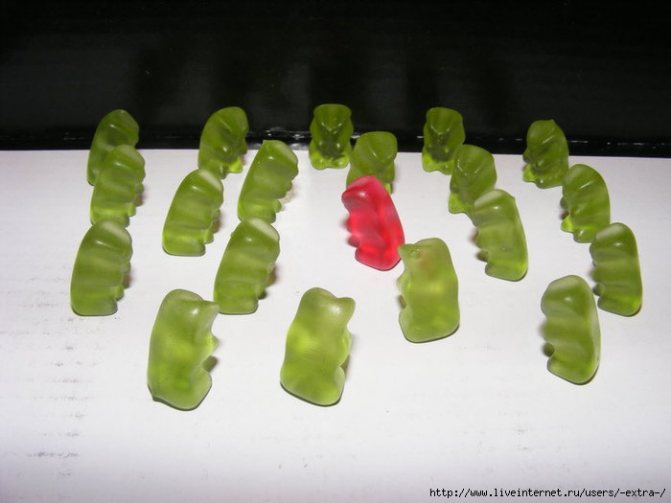Warning signs
Often children do not admit that they do not get along with the team. Mostly because they don't believe anyone can help them. Mom and dad should not lose sight of this problem. Please note if:
- the baby is reluctant to visit the children's group;
- the child returns from kindergarten or school like a squeezed lemon and does not want to go there;
- the child often cries, although there is no apparent reason for this;
- your child almost never talks about his classmates;
- the baby doesn’t say anything about life in the kindergarten or school, as if it doesn’t exist;
- the son or daughter does not invite anyone to his birthday party, does not go out with classmates.
There are, of course, other symptoms, for example, such physiological ailments as enuresis, nervous tics, nightmares. The child’s mood may often change, and aggressive notes may appear in behavior (these “abscesses” will be clearly visible if you use some projective technique in a conversation with the child, for example, asking you to draw a flower or a non-existent animal).
How to teach children to be friends? Tips for parents Read more
How to correctly explain to a child that they don’t want to play/be friends with him?
Hello! I ask for help with advice, because I myself don’t know how to convey everything correctly to my son, he is very upset...
Situation: when my son was 2 years old, I met a boy the same age and his mother on the playground. The kids became very friendly. Then a slightly younger girl came to join them. Everything seemed to be fine, the three of us were friends. Then the girl began to be more drawn to my son with communication, but the third friend apparently was not happy with this) he approached my son, pushed him, spoke rude words, bullied and teased him. My son is very vulnerable and touchy, he immediately burst into tears and did not understand why this was so... I explained that my friend was not in the mood and he did not want to offend you. But she herself made comments to this boy. This boy’s mother behaved very strangely, like they were children and was touched... but one day my son responded to this boy with the same gesture as he was offended, he pushed. The boy fell and began to cry, and then the mother began to shake her head that this is impossible (ps, but her son can do this) By the way, my son is never the first to fight. We stopped walking on our site to avoid such situations. Sometimes we met somewhere, but rarely. Time passed, we went to the garden. There are no communication problems in the garden. Our girlfriend and friend did not go to the garden and walked constantly together. Naturally they have friendship. One summer we all met by chance in the park; the children were already 3.5 years old. There were no conflicts, but the boy constantly tried to take the girl away from my son, that is, he interfered with their communication. On the same day, this boy invites my son to his birthday party in the play area. Oh, for a long time I doubted whether we should go or not, but my son was so happy about the invitation and we went (which I later regretted). Coming to the birthday party, there were 4 children, my son, the birthday boy, the friend and his friend. The playing area was isolated from others, that is, there was no one there except us. And then I see that my child is running after this couple and crying. I went up to find out what happened and it turned out that the two of them started telling him that they didn’t want to play with him and that he should leave him alone. The son was very upset and we left this birthday party.....after that we didn’t go out with them anymore. Today we met again by chance and again the same situation... now my child is 4.6. He understands everything and he is very offended. He is a kind boy and loves to communicate, but I don’t know how to explain to him that they don’t want to play/be friends with him.....I’m afraid I’ll say something wrong to him((((my personal opinion is that our ex-friend’s mother is very soft with He allows him a lot, the attitude is “he’s a child”!
Help algorithm
How to help children who have not yet learned the joy of friendship and feel lonely and misunderstood by their peers?
Lonely children need psychological support. And it’s good if the closest people – parents – provide such support. Say: “Don’t pay attention!” - means to consider the problem trivial and thereby offend the child. Let your child know that you fully accept his feelings, echo his emotions and support him with all your might. Maybe you had a story in your childhood when you felt unwanted? Share it with your child.
Article on the topic
Did you fight again? How to stop a child from offending his peers You will have to figure out why your precious child has turned into a “black sheep.” Often the reasons for this phenomenon lie on the surface. Perhaps ridicule is caused by a non-titular nationality, physical defects or mental retardation. Talk about this with your class teacher or kindergarten teacher. And explain to your child that real friends do not pay attention to these signs. And ask them not to be angry with other children, but to forgive them, because we understand some things only with age, and they, too, when they grow up, will definitely understand everything.
Think about what features in your son or daughter’s behavior that repel peers? Why do his peers, in turn, push him away? How does he stand out from the crowd? And also what good qualities does your baby have and how can he show his strengths in a team? And after thinking about it, talk to him about it. The answers to these questions may not make your little one a leader in his society, but they will certainly bring him out from the bench of outsiders.
Contact a child psychologist. There are many practices, classes and techniques that will help reveal the essence of the situation and correct it. And in group classes, children just learn the skill of friendship.
LiveInternetLiveInternet
As I already said, I was often found in search engines using this phrase.

- Have you noticed that a generous person is certainly charming ? That's why teach your son or daughter to share. Toys, a place on a bench, time, resources, or just a good mood.
- Another important skill for a full member of society is to be strong . It is clear that for a small person, force almost always has a physical vector. Explain that this is not true. To be strong is first of all to be firm and confident. Sometimes one word strictly spoken by a child is enough to prevent an emerging conflict. A simple phrase: “I don’t like this,” “Don’t do that again,” or “Stop. “I’m uncomfortable,” said by a child in a confident tone can work wonders. Don't be surprised if he tries this on you too. Accept and listen.
- People love those who show attention to them. Teach your child to be polite . This is a very cheap and easy way, “thank you” and “hello” are universal ways to show attention. Lead by example. Show that making friends and showing attention is easy and pleasant.
- People love those they understand . Arm your child with as much knowledge as possible about the society in which you live. This is especially true for children born to immigrant mothers. Many are fixated on the fact that the child speaks only the mother’s native language. It's a delusion. Language is a tool for communication. Choose the leading language that the little person will use most often. This also applies to other things: rituals and values, behavioral norms and expression of emotions.
There is no complexity in all of the above, just common sense. Now some practical advice for those who have experienced this same thing: “no one wants to be friends with a child.” 1. In this situation, it is very important to take an active position. You can’t withdraw into yourself, isolate yourself, rub shoulders only among your own people. We need to go out into people. If a specific incident occurred in a kindergarten or play group, you need to talk to the teachers. Perhaps they didn't notice the problem either. They are your main allies, not your enemies. Together you can come up with an effective plan of action. 2. You probably have no idea how much stress your son or daughter is under. In this situation, it is very important not to calm down or distract from the problem, but to talk it out. And strengthen the child’s self-confidence. Do not neglect children of any age who might show interest in your child. Let these be older neighbor children or younger children of your friends. It is important for a child to learn to behave in a hierarchy: both with elders and with younger ones. Create situations in which communication is inevitable and positive. 3. Help him be “one of his own.” Signals that you belong are transmitted on a non-verbal level. Clothes, hairstyle, shoes, manners must be neat and pleasing to the eye. A disheveled child with dirty hair suggests head lice and other parasites. Ignorance of the simplest norms of behavior leads to thoughts of a wild forest from which the whole family fled. Perhaps your child is unique and a child prodigy. Remember that, oddly enough, it is very difficult for these children to establish relationships with peers. Try to give him as “normal” a life as possible. 4. Take the first step. Invite children with whom your child would like to be friends. Meet their parents. 5. Diversify the number of social situations in which the child participates. Let him communicate with the store clerk. Do not answer questions from passers-by for him. Take them to a circle or section. Introduce him to your co-workers. 6. Don't hang over. This is a very complex rule. Especially in this situation. But also one of the most important. Let your child learn to resolve conflicts on his own; don’t interfere if you can. Give him a little more independence, this will strengthen his self-confidence and help him find a new circle of friends who will understand and appreciate him.

When a child whines
What can I do to stop my child whining about anything?
If whining has become a habitual behavior pattern for your child, you should pay attention to your parenting style. It is important to maintain a balance in parenting: the child must trust you as a strong adult, but at the same time respect your authority. I call it a balance between sensitivity and firmness.
To learn how to calm a child’s whining and take the situation into your own hands, you need to master the algorithm - what to do if a child whines. This is a fairly simple algorithm, but there are some complex aspects to it. The main difficulty is your child, who is used to whining: he will in every possible way prevent you from applying the new rules, and will try to return you to your usual pattern of behavior. Therefore, it is important not to implement the entire algorithm at once, but gradually, in small steps, change the situation and consistently place the necessary emphasis.
So, to teach a child not to whine, you need to give him a positive model of behavior, an alternative to whining.
How to do it right?
- Give instructions on how to behave in such a situation - when he wants or does not want something. Teach your child to speak directly about his desires: “Say beautifully what you want.” If the child is small and does not yet know how to speak, determine what he wants and tell him: “If you want something, you need to come up and say “give it!” Give specific instructions on how to express your desire.
- Reward desirable behavior and selectively ignore undesirable behavior. We ignore the form itself, that is, whining, but take into account the essence. If we tell a child “Don’t whine, say it normally,” we respond to his request, spoken in a normal voice, and do not pay attention to the whining.
- Motivate. Psychologists say: a person thinks about himself the way others talk about him. For a child, mom and dad are the most important people, so he sees himself through the eyes of his parents. To stimulate the desired behavior, you need to give advances - a little more faith and admiration than the situation requires. We instill in the child confidence that he can do more and better: “I see that you are in a bad mood now, but you always try. Let's try again?". We do not devalue the child, but believe in him, in his best qualities, and this motivates the child to behave better.
- Monitor and help. It’s not enough to tell the child what to do, you also need to make sure that the child has fulfilled the request: “Until you say it properly, I won’t be able to help you.” If the child doesn’t succeed, you need to give a hint on how to achieve his goal. For example, a child wants to play with his older brother’s toy. You invite him to come up and ask his brother for permission to take his toy. The kid gets rejected, comes back to you upset and whines. In such a situation, you can say: “You couldn’t come to an agreement with your brother, so you need to try again. Go and try to offer him something in return. What do you think your brother would agree to exchange his toy for?”
Whining is a childish, immature way of communication. Our task is to show the child how to communicate, to teach him to behave more consciously, more maturely. I hope you start putting the recommendations in this article into practice.
Studying our master class “What to do if a child whines” will help you summarize information, learn to “classify” whining and successfully cope with it. As a bonus, you'll also learn useful lessons on developing perseverance in children. And a selection of therapeutic fairy tales will serve as an inspiring example for your child on how to use a calmer manner of communication instead of whining.









